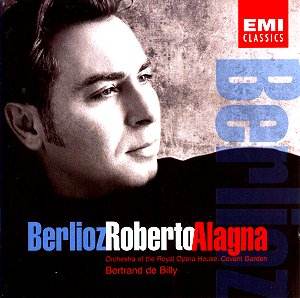This disc should perhaps have been called "Alagna
Bawls Berlioz" as it shows Alagna at his worst for much of the
proceedings. The recital is excellent in that it collects together much
of Berlioz’s writing for solo tenor, and in more sympathetic hands would
have been welcomed with open arms. In passages where the requirement
is to sing softly, one can easily appreciate why Roberto Alagna has
a high reputation, as his tone can be delectable. Unfortunately for
him, much of Berlioz’s writing for tenor in this recital is in declamatory
mode and this does not suit our hero. The shortcomings are even more
noticeable when he is joined by Angela Gheorghiu. The differences in
technique and tone are very noticeable.
EMI’s production actually makes these shortcomings
even worse, as the excellent accompaniment by the orchestra of the Royal
Opera House, Covent Garden is first class, but so badly recessed that
sometimes it is difficult to hear what is going on. This means that
Alagna almost drowns out the orchestral activity even when singing quietly.
Given the subtlety of the composer’s writing this is a major disadvantage.
Are there any good points? Yes, most emphatically -
Gérard Dépardieu’s contribution to the excerpt from Lélio
makes me long for a recording of the complete work with him as narrator.
This would really be something to cherish. His performance is as good
as I have ever heard, and sure, while the length of the excerpt does
not necessarily give a true picture of how he would deal with the whole
work, it leaves me longing for more.
Most of Berlioz’s secular vocal works are represented
here, and I can see that this disc will be used by fans of the tenor
to illustrate the power of his voice, in French repertoire, and the
area where he is gaining a growing reputation. I was surprised to see
that the tenor parts of both the Te Deum and Grande Messe des Morts
were ignored in this collection. If you are desperate, his contribution
to the Te Deum may be heard on John Nelson’s interpretation on Virgin
– here, he is heard to better advantage because of the more natural
balance in the recording.
We also have an opportunity here to listen to an excerpt
from the very early work, the last movement from Eight Scenes from Faust.
Here Alagna is supported by Dépardieu and this is one area where
we get an opportunity to hear material later utilised by the composer
in The Damnation of Faust, this time accompanied by solo guitar. EMI
have inserted this, I am sure, to give a little variety to the proceedings.
When this disc comes to the last item, (La Marseillaise)
my eardrums were in need of some respite. None was forthcoming, as Alagna
sounds as though he is leading the whole French Army from the front.
The choral contributions are first class. I know that this is a patriotic
song, but there surely are limits. Here, those limits are exceeded.
In some parts, thank God, Roberto Alagna is related to part of the mêlée
– this is the only part of the disc where this happens!
A mixed disc then, with good notes and full translations
of everything in French, German, and English, together with a synopsis
in English so you can find out where in the work these excerpts come
from and what purpose they serve in the proceedings.
Just for fans of Roberto Alagna, I am afraid.
John Phillips

